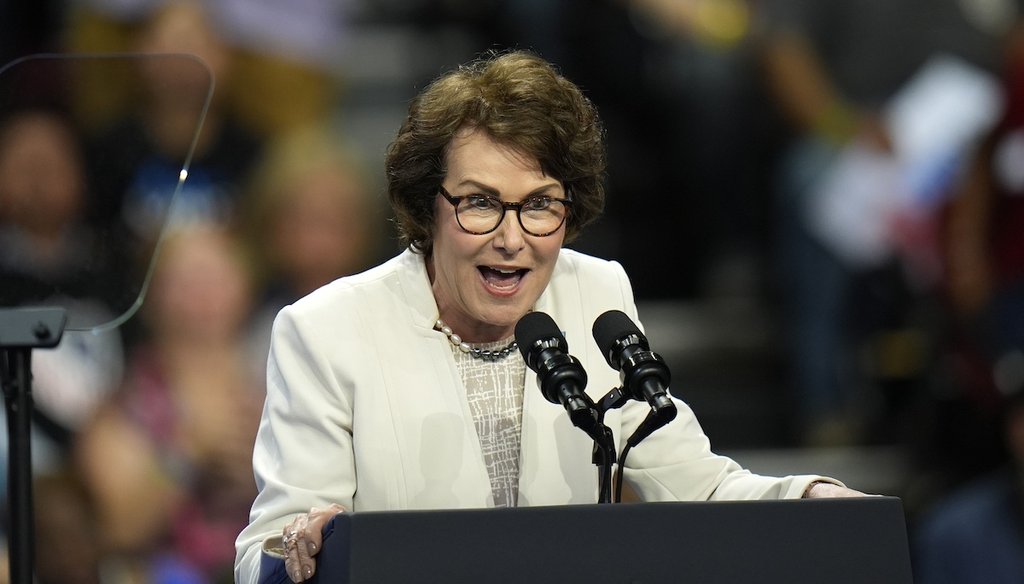

Our only agenda is to publish the truth so you can be an informed participant in democracy.
We need your help.


Sen. Jacky Rosen, D-Nev., speaks at a campaign rally for Democratic presidential nominee Vice President Kamala Harris at the University of Nevada, Las Vegas on Saturday, Aug. 10, 2024. (AP)
The 2022 Inflation Reduction Act does not change the federal tax rate for low-income households.
Taxpayers might feel some burden from higher taxes on high-earning individuals and corporations included in the Inflation Reduction Act. But analyses have found those burdens are likely offset by credits and other savings.
A conservative political group tied to Republican strategist and former White House Deputy Chief of Staff Karl Rove claims in a TV ad that U.S. Sen. Jacky Rosen, D-Nev., voted to hike taxes on families making less than $75,000 a year.
"Housing. It's a basic need for everyone. But many Nevadans struggle to afford it," a narrator says over images of Rosen. "Sen. Jacky Rosen voted to increase taxes on families making less than $75,000 a year, making it harder to afford rent or a mortgage."
The One Nation ad is part of a nearly $6 million ad buy against Rosen, who is running for reelection against Republican former Army Capt. Sam Brown in a race that could determine control of the Senate. One Nation has released three other ads since June, all saying Rosen voted to increase taxes on families making less than $75,000.
The ad’s text cited Rosen’s vote for the 2022 Inflation Reduction Act. (We messaged to One Nation for comment through its website and the law office listed on its 2022 IRS form 990 and did not receive a reply.)
Rosen campaign spokesperson Johanna Warshaw pointed to multiple fact-checks by PolitiFact and other news outlets that found similar claims misleading. The One Nation ad also misleads.
The Inflation Reduction Act was a broad spending bill that included new taxes but did not increase personal income taxes. It targeted tax increases on large corporations and wealthy money managers through a combination of new taxes and narrowing loopholes. For example, companies earning more than $1 billion in profit pay a new 15% corporate income tax.
Alex Durante, an economist at the Tax Foundation, a tax policy think tank, said corporations could pass increased tax burdens to consumers through higher prices and employees through lower wages and decreased benefits, but those changes could be offset by credits in the Inflation Reduction Act, such as for green energy and health care subsidies.
Republican-backed groups making claims similar to the One Nation ad have relied on a 2022 Joint Committee on Taxation Inflation Reduction Act analysis that showed an increased tax burden in every bracket. However, that analysis did not include other money-saving provisions in the law, including:
Tax credits for new and used electric vehicles.
Tax credits for green energy home improvements.
The extension of the American Rescue Plan’s expanded Affordable Care Act subsidies through 2025.
Allowing Medicare to negotiate drug pricing directly with drug companies.
Another independent analysis from the Urban-Brookings Tax Policy Center showed that any tax change affecting the bottom 80% of taxpayers is extremely small.
A One Nation ad said Rosen "voted to increase taxes on families making less than $75,000 a year."
Rosen voted for the 2022 Inflation Reduction Act, which increased taxes on high-income earners and large corporations. The law did not increase taxes for people making less than $75,000 a year.
Some of the higher tax costs for wealthier entities might be passed to consumers and employees, but those changes likely will be offset through the law’s credits and other money-saving provisions. Independent analyses have found that taxpayers in that income range are likely to see little change in what they pay in taxes.
We rate the claim Mostly False.
One Nation, "Basic", Aug. 23, 2024
One Nation, "Essentials", June 18, 2024
One Nation, "The Worst", July 9, 2024
One Nation, "Squeeze", Aug. 13, 2024
Politico, "Top conservative group pushes new ad campaign against Rosen in Nevada", June 18, 2024
Senate.gov, Vote on H.R. 5376, Aug. 7, 2022
Congress.gov, Text of H.R. 5376, Aug. 7, 2022
Open Secrets, "Karl Rove-linked ‘dark money’ group raised, spent big ahead of 2018 midterms", Nov. 21, 2019
The Associated Press, "AP fact check: GOP skews budget bill’s impact on IRS, taxes", Aug. 10, 2022
PolitiFact, "Fact-checking how much the Inflation Reduction Act affects taxes", Oct. 19, 2023
PolitiFact, "GOP group exaggerates effect of Inflation Reduction Act", Oct. 31, 2022
PolitiFact, "Tom Cotton misleads on how Inflation Reduction Act will impact size of IRS, taxes", Aug. 23, 2022
PolitiFact, "GOP claim on tax hikes in Democratic bill doesn’t factor in subsidies, savings", Aug. 3, 2022
Tax Foundation, "Details & Analysis of the Inflation Reduction Act Tax Provisions", Aug. 10, 2022
Tax Foundation, "Inflation Reduction Act one year after enactment", Aug. 16. 2023
Urban Institute-Brookings Institution Tax Policy Center, "T22-0016 - H.R.5376, The Inflation Reduction Act of 2022 as Passed by the Senate, by ECI Percentiles, 2023", Aug. 11, 2022
Joint Committee on Taxation, Analysis of H.R. 5376, July 29, 2022
Email exchange with Rosen spokesperson Johanna Warshaw, Sept. 4, 2024
Email exchange with Tax Foundation economist Alex Durante, Sept. 6, 2024
IRS.gov, Credits and deductions under the Inflation Reduction Act of 2022, Aug. 25, 2024, accessed Sept. 9, 2024
KFF, "Inflation Reduction Act health insurance subsidies: what is their impact and what would happen if they xxpire?", July 26, 2024
In a world of wild talk and fake news, help us stand up for the facts.
